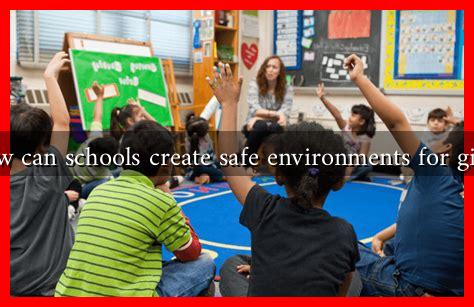-
Table of Contents
- How Can Schools Create Safe Environments for Girls?
- The Importance of Safety in Schools
- Strategies for Creating Safe Environments
- 1. Implementing Comprehensive Anti-Bullying Policies
- 2. Promoting Gender Equality Through Education
- 3. Creating Safe Spaces for Girls
- 4. Engaging Parents and the Community
- Case Studies and Success Stories
- Conclusion
How Can Schools Create Safe Environments for Girls?
Creating a safe environment for girls in schools is essential for their academic success, emotional well-being, and overall development. A safe school environment not only fosters learning but also empowers girls to express themselves freely and pursue their ambitions without fear. This article explores various strategies that schools can implement to ensure the safety and well-being of female students.
The Importance of Safety in Schools
Safety in schools is a multifaceted issue that encompasses physical, emotional, and psychological aspects. According to a report by the National Center for Education Statistics, nearly 20% of students aged 12-18 reported being bullied at school. This statistic highlights the urgent need for schools to address safety concerns, particularly for girls who may face unique challenges such as gender-based violence and harassment.
Strategies for Creating Safe Environments
Schools can adopt several strategies to create a safe and supportive environment for girls. These strategies can be categorized into policy changes, educational programs, and community involvement.
1. Implementing Comprehensive Anti-Bullying Policies
Establishing clear anti-bullying policies is crucial for creating a safe school environment. These policies should include:
- Clear definitions of bullying and harassment.
- Reporting mechanisms that are accessible and confidential.
- Consequences for perpetrators that are consistently enforced.
- Support systems for victims, including counseling services.
For example, the state of California has implemented the “Safe Place to Learn Act,” which mandates schools to develop anti-bullying policies that specifically address harassment based on gender and sexual orientation.
2. Promoting Gender Equality Through Education
Educational programs that promote gender equality can significantly impact the school environment. Schools should incorporate curricula that:
- Teach respect and empathy towards all genders.
- Address stereotypes and challenge traditional gender roles.
- Encourage girls to participate in STEM (Science, Technology, Engineering, and Mathematics) fields.
Programs like “Girls Who Code” have successfully engaged girls in technology, helping to break down gender barriers and build confidence in their abilities.
3. Creating Safe Spaces for Girls
Designating safe spaces within schools can provide girls with a refuge where they can express themselves without fear of judgment or harassment. These spaces can include:
- Girls’ clubs or support groups.
- Counseling centers staffed with trained professionals.
- Workshops focused on self-defense and assertiveness training.
For instance, the “Girls’ Empowerment Project” in New York City offers workshops that focus on building self-esteem and leadership skills among girls, creating a supportive community.
4. Engaging Parents and the Community
Involving parents and the broader community is essential for fostering a safe school environment. Schools can:
- Organize workshops for parents on recognizing signs of bullying and harassment.
- Encourage community partnerships with local organizations that support girls’ rights.
- Host events that promote awareness of gender issues and safety.
Programs like “The Parent Project” have successfully engaged parents in discussions about youth safety, leading to more supportive home environments.
Case Studies and Success Stories
Several schools around the world have successfully implemented these strategies, resulting in safer environments for girls. For example:
- The “Safe Schools” initiative in Australia has led to a significant decrease in reported bullying incidents among girls.
- A school in Canada introduced a peer mentorship program that pairs older girls with younger students, fostering a sense of community and support.
Conclusion
Creating a safe environment for girls in schools is not just a responsibility; it is a necessity. By implementing comprehensive anti-bullying policies, promoting gender equality through education, creating safe spaces, and engaging parents and the community, schools can foster an environment where girls feel secure and empowered. As we work towards these goals, it is crucial to remember that a safe school environment benefits everyone, leading to a more inclusive and supportive educational experience.
For more information on creating safe school environments, visit StopBullying.gov.

